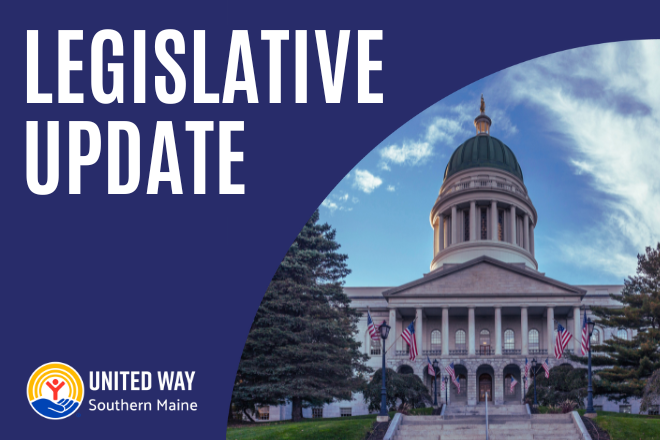Dear Community Advocates,
At United Way of Southern Maine, we bring people and resources together to tackle our community’s greatest challenges – food insecurity, housing instability, and lack of access to child care and health services.
This month, that means keeping a close watch on the federal budget process and what it could mean for ALICE (Asset Limited, Income Constrained, Employed) families in York and Cumberland counties. These households are especially vulnerable to shifts in funding for essential programs.
Our Summer Advocacy Action is here. With the return of Congress this week, now is the time to use our voices and advocate for the programs Maine families rely on. When we act together, we help ensure everyone in our community has a chance to thrive.
Here’s a snapshot of the latest developments across the issues that are impacting Maine families — and where your voice can make a difference.
Child Care & Early Learning (CCDBG)
- Maine’s child care shortage costs $403M annually in lost workforce participation (ReadyNation).
- Less than 15% of eligible families receive CCDBG subsidies; 68% of funds support children under age 5.
- Infant care costs $11,960–$15,444/year, making it unaffordable for families without subsidies.
- Without strong federal investment, too many families will continue to face difficult choices between work and child care.
Emergency Food & Shelter Program (EFSP)
- EFSP supports local food pantries, shelters, and utility/rent assistance. In Maine, county allocations ranged from $7,000 to $47,000 in 2024.
- The FY26 federal budget proposal includes the elimination of EFSP, removing flexible dollars that keep pantry shelves stocked and shelters open in York, Cumberland, and beyond.
Housing Assistance
- The FY26 federal budget proposal includes a 44% reduction in HUD programs, consolidating rental assistance into a block grant.
- Maine recently secured $29M in HUD funds, but proposed reductions would destabilize rental assistance and affordable housing programs.
- At the state level, Maine has committed: $21M in emergency housing funds, $30M for new housing initiatives, and a pilot $800/month rent relief program for approximately 2,400 Mainers. These investments are important, but not enough to offset federal reductions.
LIHEAP (Heating Assistance)
- Nearly 1,000 households will see reduced heating benefits due to SNAP–LIHEAP eligibility changes (Maine DHHS).
MaineCare (Medicaid)
- 393,000 Mainers rely on MaineCare for essential health coverage.
- Starting Jan. 2027, 90,000 adults will face new 80-hour/month work requirements. The Maine DHHS officials estimate more than 31,000 Mainers could lose coverage in year one (Maine DHHS, July 2025).
- Proposed changes would end coverage for 3,000 legally present immigrants, including refugees and survivors of human trafficking.
- Maine’s health system could lose an estimated $5 billion over 10 years, affecting hospitals, community health centers, behavioral health providers, and pharmacies.
SNAP (Food Assistance)
- In February of 2025, 176,500 Mainers received SNAP, including children, older adults, veterans, and people experiencing homelessness (Maine DHHS).
- Expanded work requirements will affect 40,000 recipients, reducing benefits by $26/month per household.
- Maine will lose $4.8M in SNAP-Ed funding, which reached 18,759 youth and 2,987 adults in 2024.
- State costs could rise by $60M annually under new federal cost-sharing requirements.
Volunteer Income Tax Assistance (VITA)
- For over 50 years, VITA has provided free IRS-certified tax preparation for low- and moderate-income households.
- Locally, in 2025, CA$H Greater Portland, a United Way of Southern Maine program, served 850 households, returning $1.4M in refunds and saving families $205,000 in fees. 161 households claimed the Earned Income Tax Credit (EITC), with an average income of $24,472, highlighting the program’s importance for ALICE families.
Your voice is needed:
- Contact Maine’s congressional delegation today. Urge them to protect funding for MaineCare, SNAP, child care, LIHEAP, housing, and emergency food programs.
- Share your story. How have these programs supported you, your family, or your organization? Personal stories help decision-makers understand the real impact in Maine.
- Act quickly with intention to make sure Maine’s priorities are part of the conversation.
Together we can ensure ALICE families in York and Cumberland Counties — and across our state — have the resources they need to live, work, and thrive.
